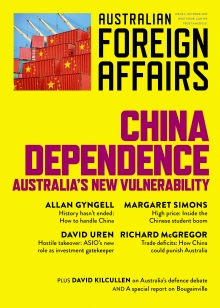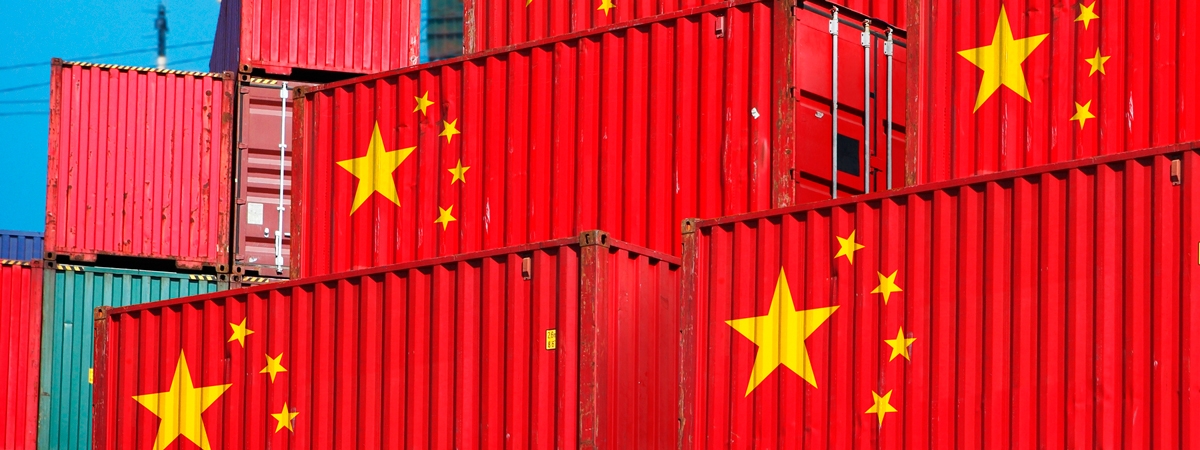
This extract is featured in Australian Foreign Affairs 7: China Dependence.
To read the full issue, log in, subscribe or buy the issue.
In July 2019, in a story applauding the construction of a new gas pipeline from Russia, Chinese newspaper The Global Times made sure to play up an additional benefit of the project. Not only would the pipeline bring more gas from Russia, the paper stated. It also meant that China could cut down on imports of liquified natural gas from Australia.
From the moment Australia’s ties with Beijing began to sour, Chinese officials, scholars and commentators have pushed a similar menacing message. The state media, in its various manifestations, has consistently warned Australia that its China policy is “suicidal” for economic ties. Don’t think you can “dig gold” in China, one scholar has said, while riding on America’s coat-tails elsewhere. The Global Times, the Chinese Communist Party–owned tabloid that has long acted as Beijing’s foreign policy bovver boy, is just one in a long line of outlets telling Australia not to bite the hand that feeds it.
The bigger China gets, the more willing it is to throw its weight around. Little wonder, then, that such threats have put the Australian government and business on edge about possible economic coercion from Beijing. Having staked their political credibility on ending years of budget deficits, prime minister Scott Morrison and treasurer Josh Frydenberg have a nervous eye on trade ties.
The budget is already primed for a windfall in corporate tax receipts, courtesy of sky-high iron ore prices, driven by strong steel production in China and supply disruptions in Brazil. There is no doubt a temptation to soft-pedal the politics of relations with China to ensure trade ties are not interrupted. Certainly, the idea that Australia is at Beijing’s mercy on the economy is entrenched in the popular media. “If China decided to get narky with us,” Channel 7’s David Koch said to Morrison in an August 2019 interview, “we go into depression. It’s as simple as that.”
The immediate outlook for Australia’s political relationship with China is not good. In any given week, the number of issues that are the focus of governmental dispute or popular sourness is astounding. Crown Casino and Chinese high rollers. Nasty, racially tinged spats between rival swimming stars. The South China Sea. Hong Kong, which spilled over into fights on Australian campuses. Controversy over Uyghurs with Australian passports or residency struggling to leave China. The hacking of Australian universities and the federal parliament. The blocking of ministerial visits. Canberra’s treatment of Huawei, the Chinese telecommunications company. Gladys Liu. Calls for an Australian military build-up in and around Darwin. Head-on competition in Papua New Guinea and the Pacific. The arrest of Chinese-Australian writer Yang Hengjun. If one issue involving China isn’t dominating the news, another invariably is.
With the relationship in such disarray, the fear of Chinese economic coercion is entirely rational. In recent years, Beijing has used its growing economic weight to sanction numerous countries, most notably South Korea, which was hit in 2017 over its deployment of a US missile shield that Beijing said infringed on its sovereignty. Beijing restricted rare earths exports to Japan in 2010 after a territorial dispute flared up. The same year, Norwegian salmon imports were cut when a Chinese dissident was awarded the Nobel Peace Prize. The Philippines suffered in 2012 and 2016 when their territorial disputes with Beijing in the South China Sea reignited. Visits by the Dalai Lama have often been followed by cancellations of export orders.
China is not shy about advertising its muscle either. In recent months, Beijing has said that Canada will face “repercussions” if it bans Huawei from its new mobile phone network. Likewise, Turkey has been warned that “commercial and economic relations” will be damaged if Ankara keeps criticising the internment of Muslim Uyghurs in Xinjiang.
So far in Australia, however, the fevered debate about the threat of Chinese coercion has run far ahead of any action. Some Australian wine has been held up in Chinese ports. And, for much of 2019 Chinese importers of thermal coal have turned away or slowed the unloading of cargoes from Australia. In both cases, the Chinese actions carried a strong stench of politics, but they also involved other factors, such as difficulties in managing new customs rules for foreign wine and coal traders’ attempts to take advantage of price fluctuations. Hugh White, a prominent commentator on security issues, has joked that many Australians began to panic about sanctions before Beijing “had even begun to clear its throat”.
Certainly that was the case when the shipments from Treasury Wines were held up in Shanghai in early 2018. Top company executives bombarded then prime minister Malcolm Turnbull’s office with phone calls demanding he intervene to get the wine off the docks. The company’s chairman, Graham Kraehe, intoned gravely about regional geopolitics. “We can’t rely on the US to be a big player in the Asia region,” he said. The company’s anxious musings turned out to be overly pessimistic. Since that hiccup, Treasury’s sales into China have continued to grow.
Running in parallel to the debate on China’s economic coercion have been increasing calls to find new export markets to reduce reliance on China. Australia should diversify its markets before China finds new sources of supplies. Or, as the old joke goes, we had better get our retaliation in first. Peter Varghese, in his 2018 report to government on strengthening ties with New Delhi, was explicit about the need for diversification and the value of India in that quest. “There is no other single market in the world that has more growth opportunities for Australia than India,” wrote the former secretary of the Department of Foreign Affairs and Trade.
Not everyone thinks this approach will work. According to James Laurenceson and Michael Zhou of the Australia-China Relations Institute (ACRI), such prescriptions misunderstand why trade flourishes in the first place. Unlike security ties, trade is largely determined by market forces, a mix of economic complementarities and purchasing power, “not elected officials or bureaucrats sitting in Canberra”.
The search for alternative markets is not unique to Australia. Canada even has a Minister for International Trade Diversification, in part aimed at weaning the country off an over-reliance on North America for business. But for now, in Australia, diversification seems good in theory but difficult in practice.
Whatever China has been up to, it hasn’t hurt bilateral trade so far. In 2018, a year of seething tensions, when Beijing froze official contacts with Canberra and cold-shouldered Australian business, two-way trade went up year-on-year by more than 17 per cent, totalling A$193 billion, according to DFAT.
The continued strong growth in trade, substantially in Australia’s favour, confirms a decade-long trend, which has seen China outperform all other markets for Australian exports by a large distance. According to ACRI’s tabulation, exports to China have increased by A$78.5 billion over the past decade, nearly tripling in value. By contrast, sales to Japan and the United States have been stagnant. Exports to India and Indonesia, two countries often touted as Australia’s future, have risen by just A$5 billion. In June 2019, China took a record 40 per cent of all Australian exports.
But the politics of dealing with China means that the explosion in trade is often depicted as a vulnerability as much as a cause for national celebration. Chris Renwick, who as a Rio Tinto lawyer wrote the first contract for iron ore shipments to China in 1970, two years before the establishment of diplomatic ties, remembers that Chinese buyers used to ask for a discount in the early days, because, they said, they couldn’t compete with the Japanese. The first sale of iron ore to China was considered a commercial coup at the time. Until then, China had only imported iron ore from North Korea. Now North Korea is an afterthought and Japan is a sideshow. It is Chinese demand that drives the market. Renwick, who went on to head Rio’s iron ore operations, reflects the view of many business leaders these days when he says the tables have been turned in bilateral economic relations. The power balance today runs in China’s favour. “They needed us then,” he said. “Now they believe that we need them.”







